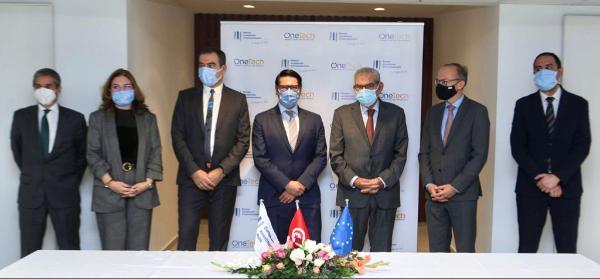
In Tunis on Thursday, Ricardo Mourinho Félix, vice-president of the European Investment Bank (EIB), reiterated the Bank's ongoing commitment to economic growth and social inclusion in Tunisia.
Supporting entrepreneurship, innovation and social infrastructure is a key focal point of the vice-president’s visit to Tunisia. As part of this support, two financing contracts have been signed, one with OneTech Group and the other with microfinance institution Enda Tamweel. Vice-President Mourinho Félix also announced €45 million in financing for the public transport authority Transtu to support more inclusive and sustainable mobility.
Stronger financial inclusion
Vice-President Mourinho Félix signed a new financing agreement in Tunisian dinars (amounting to € 9 million) with Enda Tamweel to strengthen the EIB's support for Tunisian micro-entrepreneurs. This new operation falls under the Microfinance Facility for the Southern Neighbourhood region set up in cooperation with the European Union.
The deal will generate significant added value because it will make financing in local currency available on particularly attractive terms for a period of two years.
“Providing micro-entrepreneurs with access to finance is a key factor for economic and social growth. I am therefore delighted to have signed this new loan in local currency, as a further sign of our commitment to project promoters, especially women and young people and vulnerable populations living in remote areas. In Tunisia, we will continue to support financial inclusion because its impact is real,” said Vice-President Mourinho Félix after signing the new financing contract with Enda Tamweel.
The last operation signed with Enda Tamweel under the Economic Resilience Initiative's Microfinance Facility was in 2019, and financed 2 500 projects promoted by women and young people.
This new agreement brings the total amount of transactions signed with Enda to €24 million.
More support for the private sector
Vice-President Mourinho Félix also signed a €9 million increase in the loan granted to OneTech Group in 2017. This increase takes the EIB's total lending to OneTech to €30 million.
After signing the deal, Mr Mourinho Félix said: "Supporting development and innovation is a major priority for the EIB. Our mission is to create attractive financial conditions for private sector companies to help develop the Tunisian economy and boost competitiveness. We are proud to support Tunisian companies, such as OneTech Group, which is an inspiring success story for Tunisia and the region as a whole.”
This financing supports OneTech Group’s investments in research, development and innovation, and also strengthens its production capacity. The initial loan has already helped create 1 300 jobs, 50% of which are held by women.
This project is therefore fully in line with the stated objectives of the European Union and the EIB, which aim to promote the economic resilience of the European Union’s neighbouring countries. It is also part of the Horizon 2020/InnovFin programme for innovative companies, which is co-financed by the European Commission. Tunisia is the only country in the region to have benefited from these resources.
More inclusive and sustainable mobility
During the visit, Vice-President Mourinho Félix announced a new EIB-funded operation for sustainable urban transport: a deal with Transtu for acquiring trains and equipment for the TGM light rail line.
“This new €45 million financing will facilitate mobility in Tunisia while improving the quality of urban transport services. As the European Climate Bank, we are very pleased to support this project, which will have a direct impact on the daily lives of Tunisians,” he said.
This project is co-financed by the European Bank for Reconstruction and Development for an overall amount of €90 million. More broadly, the project fits in with the EIB-funded programme for renewing railway infrastructure.
Vice-President Mourinho Félix added that the EIB is ready to make more than €400 million available to Tunisia to support infrastructure projects, particularly in the energy and transport sectors. As the EU Climate Bank, supporting projects that contribute to climate change adaptation and mitigation will be a major focus of the EIB’s work in Tunisia. The Bank will also continue to prioritise the financing of essential social infrastructure in the education and urban development sectors.
The EIB
The European Investment Bank (EIB) is the long-term financing institution of the European Union (EU). Its shareholders are the EU Member States. In the Mediterranean region, it is committed to helping partner countries achieve sustainable development and growth. The EIB offers financial and advisory services tailored to the needs of project promoters in these countries. Large-scale infrastructure investments, loans for small and medium enterprises, guarantees for riskier projects, technical advice to ensure optimum project design and partnerships for new entrepreneurs are all services provided by the EIB. In response to the changing environment in the Mediterranean region, the EIB continues to diversify its range of instruments to boost employment and sustainable growth.
Since 2011, the EIB has committed €2.3 billion to financing projects in key sectors of the Tunisian economy such as energy, private sector support, infrastructure, education and social housing.

©EIB
Download original

©EIB
Download original

©EIB
Download original

©EIB
Download original